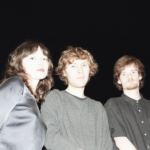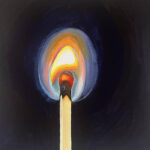The Wonder Years – ‘No Closer To Heaven’ Review
Posted: by Sean Gonzalez

The Wonder Years have been the patron band of growing up, many of their fans have stuck around to help embody Dan and companies hardships in being real people. After their trilogy of growing up ended on the maxed out performance of ‘I Just Want To Sell Out My Funeral’ I was wondering how this band would meet up with how my life has turned, how the expectations of their music would be, and even more how the devil was still fighting me. No Closer To Heaven is the newest full length record from the South Philly band, but I didn’t need to tell you that.
The biggest change in The Wonder Years sound has been their dynamics. Each album showcased more and more of the softer lines from Soupy’s voice box blending with more textured instrumental sections, and this album frankly takes that to an entire new level. The tracks on No Closer To Heaven are more drawn out, with a majority of them clocking in at slower BPM’s than most fans would be used to. The guitars are rarely in your face anymore, I can’t tell if that is just a drop in the mixing or if the writing process wanted to hinder their distortion to help embrace the ballads.
Dan’s lyrics are their usual potent, depressing and fantastically written words. ‘I Don’t Like Who I Was Then’ and ‘Cigarettes & Saints’ might be a bit cringeworthy because of the barrage of metaphors and similes, but Soupy’s always had a knack for creating stellar imagery that way. His approach to the microphone is still the raw and power driven voice he has been using since day one. Since his side project however, he has developed a new mid range that helps take each song on their own emotional journey through his voice box. He invites fellow emotionally driven vocalist Jason Butler to duet with him on ‘Stained Glass Ceilings’ and it made me tear up. The song took a little while to build up to the apex point of release, but when it rained it poured.
Every time I want to talk about the sound of the album I find myself veering back to Soupy and his emotional prowess as a vocalist. The message here is maybe the most stable we have found the singer in, finally tackling his issues and trying to see how he looks from the outside. Besides his own demons, Dan goes after classism, racism and in a modest way religion (per usual). At the end of the day though, we are still left with the same method of preachery that the band has been going after since their old line, “it’s not about forcing happiness, it’s about not letting sadness win.” This is entirely evident on the self-titled closing track. Instead of a banging track tying up the loose ends, we are left with an acoustic performance tripping over the ends.
The mixing still bothers me. Play ‘No Closer To Heaven’ and then play ‘You In January’ back to back. The levels are not the same, why is the acoustic song virtually louder than one of the bittersweet songs on here? The drums feel like toys on certain songs (‘The Bluest Things On Earth’), with the cymbals all over the place and muddying up the presence of ‘Cardinals.’ The guitars are not loud enough to embrace the grasp ‘Stained Glass Ceilings’ has. Compare the way the guitars enter that track (almost without any power) to how they break through the barrier on ‘I Won’t Say The Lord’s Prayer’ or even similarly structured ‘Suburbia.’ ‘A Raindance In Traffic’ was known for it’s bombastic guitars mixing with pop-punk gang whoas and every time The Wonder Years go at it here, it sounds weak. Maybe my expectations are too high sound wise, but something is off here and it needed to be addressed.
What do we have here though? We have an acapella that turns into a bloody manifestation in ‘A Song For Ernest Hemingway.’ This song is found on the back half of the album, which arguably is the most diverse because of the enormous amount of keys used in each track. ‘A Song For Patsy Cline’ is one track that has a great idea that was fun to hear from this band. The stop n’ goes are viciously pop-punk, but the blending of harmonies on each note gives it a dark presence, just like the eerie chord progression to ‘Palm Reader.’ The songs feel as introspective as Campbell’s stream of lost conscience.
No Closer To Heave really is split up in two parts. We have the first half reminiscing on the brothers theme, and how if we cannot save them then we are not allowed to be called saviors. It’s a biting motif where I think Dan gets into it with himself because he’s revered as this poster boy for savior and finding the happiness. Maybe he never will find it and we cannot keep leaning on him about it. The back half of the album seems to be dealing with himself alone now, since his brother is disposed of in ‘Cigarettes & Saints.’ We still have to deal with ourselves and this album is an exclusive way to do that. The back half of the album has lyrical callbacks to previous albums as usual, still showcasing The Wonder Years are always going to be honest with us.
Believe it or not, No Closer To Heaven is a great, half-cohesive record. The songwriting is very explosive here. Dan’s writing is the same as it always been, if not added with more bitter imagery than before. The Wonder Years have been the leading band of the genre for the past five years, and this album will not sell them short on anything (except maybe the mixing job). While finding themselves though, there are some questionable things across this LP like mixing, drawn out cheesy builds and maybe too much wanting to build their dynamics. What will be hailed as the next standard to the genre is just in it’s infant steps currently. I still want to see how this album will make me feel a year later.
Score: 7.5-8/10










